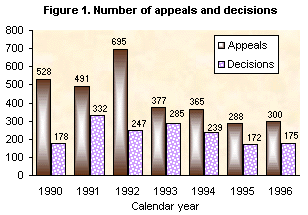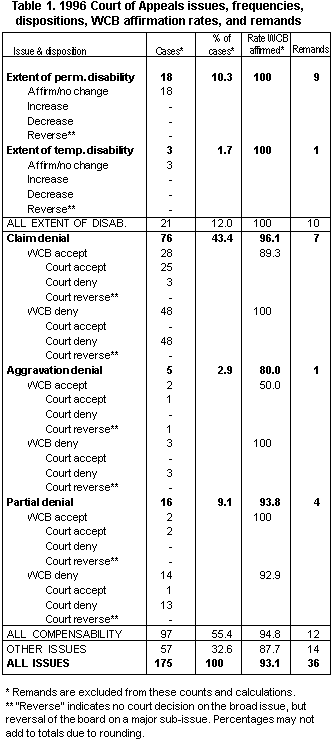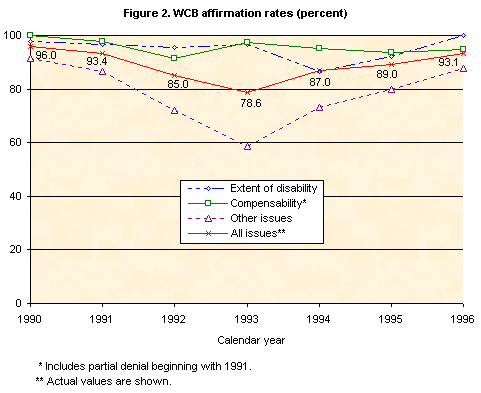
Requests and Orders
In 1996 there were 300 appeals to the court on Workers' Compensation Board (WCB) decisions, a modest increase over the previous year's count and the second fewest since 1989. See Figure 1. The number of board orders on review also increased in 1996; the appeal rates for both years were almost identical at just over 21 percent, the lowest values of the past six years.
 There were 175 court decisions in 1996, three more than the previous
year. This count excludes one order on reconsideration, one order
on remand from the Oregon Supreme Court, one decision on a non-complying
employer matter, and one request for attorney sanctions for an earlier appeal
to the court (discussed below). The count also excludes remands, which numbered
36 (compared to 26 in 1995). The most common reasons for remanding:
recent changes to the law (20 cases), rule determined to be invalid (seven
cases, all extent of permanent disability disputes), and the court could
not determine whether the board considered something (four cases). Court
decisions on Department of Consumer & Business Services (DCBS) "contested
cases" are excluded from these counts; they are addressed in the final
section of this report.
There were 175 court decisions in 1996, three more than the previous
year. This count excludes one order on reconsideration, one order
on remand from the Oregon Supreme Court, one decision on a non-complying
employer matter, and one request for attorney sanctions for an earlier appeal
to the court (discussed below). The count also excludes remands, which numbered
36 (compared to 26 in 1995). The most common reasons for remanding:
recent changes to the law (20 cases), rule determined to be invalid (seven
cases, all extent of permanent disability disputes), and the court could
not determine whether the board considered something (four cases). Court
decisions on Department of Consumer & Business Services (DCBS) "contested
cases" are excluded from these counts; they are addressed in the final
section of this report.

Issues
The number and relative frequency of each issue are given in Table 1. Cases without one of the issues specified in the table are counted as "other-issues." The percentage frequency of extent of disability cases has dropped from its high of 27.4 percent in 1991 to the second-lowest value of the past nine years, 12.0 percent. The frequency of compensability, on the other hand, has risen from a low of 32.6 percent in 1990 to the highest value of the same nine-year period, 55.4 percent. The most frequent other issues (including those in cases with a specified issue) were insurer penalty (18 cases), responsibility (16 cases), claimant attorney fees (12 cases), timeliness (10 cases), jurisdiction (nine cases), and claim bar/preclusion (eight cases).
Issue Disposition
Court issue dispositions and WCB affirmation rates are also given in Table 1. The court reversed the board in three claim denial cases, one aggravation case, one partial denial case, and seven other-issue cases. The affirmation rate for extent of disability cases was 100 percent, and the overall rate, 93.1 percent, was the highest since 1991. See Figure 2.

 Other Data
Other Data
The median time lag from appeal to order was 288 days (9.5 months), as shown in Table 2. Claimant was the petitioner in 63.4 percent of the cases. SAIF was the insurer in 31.9 percent of the cases (includes non-complying employer and multiple-insurer cases). On permanent total disability cases (those with PTD granted at any level), the court affirmed one grant and two rescissions of that award.
Attorney Sanctions
An employer moved for sanctions, arguing that claimant's petition asked the court to weigh evidence differently than did the board. The court ruled that, because the requested action was outside the scope of review, there was no reasonable prospect of prevailing; the appeal was therefore "frivolous" per ORS 656.390, and sanctions for $1,646 against claimant's attorney were allowed. In the only other motion for sanctions, the claimant's request was denied.
DCBS Contested Cases
Three contested cases were subjects of court decisions in 1996 (excludes court dismissals and remands to the director to approve a stipulation). The issues were medical fees, vocational assistance (DCBS dismissed for failure to appear), and monetary adjustment between insurers in a responsibility dispute. The court reversed and remanded in the first and third case, and affirmed the director in the second.
| DCBS Public Home Page | IMD Home Page | Site Search Engine |
If you have questions about the information contained in this document
please contact by e-mail or phone:
Russell Reed, Research Analyst,
Research & Analysis Section, Information Management Division (503) 947-7343
This document was originally published in April 1997.
Document URL: http://www.cbs.state.or.us/external/imd/rasums/6_2340s.htm
[Printed form: 440-2340(4/97/IMD)]
In compliance with the Americans with Disabilities Act (ADA), this publication
is available in alternative formats by calling (503) 378-8254 (V/TTY).
The information in IMD publications is in the public domain and may be reprinted
without permission.